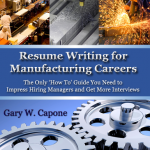The election is over and Barack Obama will be our next President. His campaign demonstrated a few techniques that any job seeker can employ to improve their job search.
Positioning Statement
What was the cornerstone of the Obama campaign – the one word that summarizes the reason to vote for Barack Obama? I doubt anyone has confusion here. We've heard "Change" so many times that this one word has come to represent everything about the Obama campaign.
When you are considered for a position by an employer, what word or phrase will represent everything you offer? You should develop a theme that a hiring manager can clearly understand and articulate.
Contrast this with John McCain. The one word that saturated his campaign was "Maverick." Although the use of this word had many similarities to Obama's use of "Change," it didn't resonate with voters. The reason for this is the complexity of the image. Obama means change, people are unhappy and change will make them happy. McCain is a maverick, a maverick will make changes, the people are unhappy and the changes will make them happy.
It's essentially the same argument, but for Obama, it's clearer. This clarity translated into greater trust, and more votes.
Benefits
Which candidate offered the hiring managers (all of us) more value and greater benefits?
Both candidates made a lot of campaign promises. Obama's were more specific in many cases. For example, his tax policy consistently focused on: "Cut taxes for 95 percent of workers and their families with a tax cut of $500 for workers or $1,000 for working couples."
Hiring managers make decisions based on which job seeker will provide more value to them and to their company. A $500 tax cut is not significant for most people, but it is a tangible, specific benefit.
In your interviews, you need to demonstrate what value you can provide. The best way to do this is to show how you have provided value to past employers. For example, "at ABC company, I implemented a new material handling system that improved our processes and saved the company $250,000 per year." For a hiring manager that wants to improve their material handling processes, this candidate would make a very strong impression.
Storytelling
Political conventions, speeches and debates have developed a consistent strategy used by both parties – Storytelling. How many times have we watched a candidate parade a series of people, telling the story of each person and how they will help that person if elected.
The point of this strategy is to create a very clear image of what the candidate will deliver and make a strong personal connection. Political candidates have learned that people don't vote for logical, factual arguments by themselves. The logic and facts are important, but the emotion and personal connection are at least as important.
Storytelling can be very effective in an interview. You can show a hiring manager, very clearly, what you have done in the past. This gives the hiring manager a feeling of what it would be like to work with you. It's this feeling that can tip the scales in your favor and get you hired.
Exercise
Pick the candidate you supported in the election, or do this exercise with both candidates.
On a piece of paper, draw a vertical line down the center of the page. Write the candidate's name at the top of the left column.
Under the candidate's name, list the top three reasons why the candidate should be our next President.
Write a short paragraph, 3-5 sentences, for what you would say to someone that is undecided to persuade them to support the candidate.
At the top of the right column, write your name.
List the top three reasons why you should be hired.
Write a short paragraph, 3-5 sentences, for what you would say to someone that is undecided about hiring you.
Compare the two columns.
- Which is more specific?
- Which demonstrates more value to the hiring manager?
- Which is more personal, giving storytelling examples?
- What will you change in your resume and next interview?




